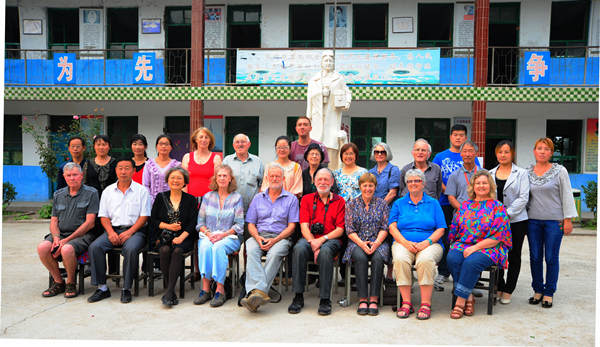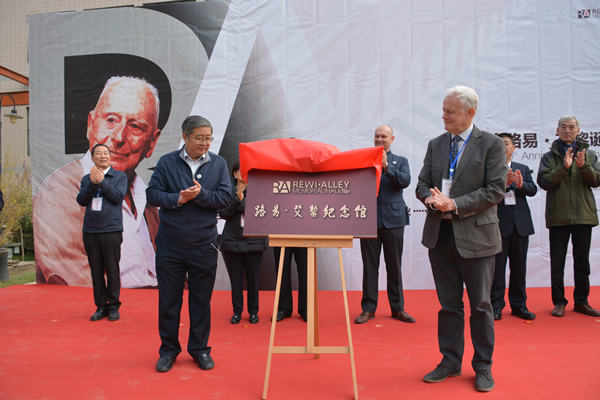RESOURCES

In the last three decades, the world has observed a major transformation of the Chinese society, economy and position on the world stage. China has become an indispensable global player. Yet in the West, the dominant narrative has failed to understand that this does not mean that China has become Westernized. China is creating an alternative to the West.
The West has not made a serious effort to understand a Chinese perspective, and to a great extent has not appreciated that an alternative understanding exists. Confucius said, "Real knowledge is to know the extent of one's ignorance." The West, with its Western-centric approach, through its ignorance and failure to understand China, has placed itself in peril of being left behind in a newly emerging world order.
We see this ignorance in headlines in Western newspapers, in which the Western perspective is dominant. There is selective reporting to portray negative impressions, and facts are often misrepresented. Too often Western reporting lacks critical evaluation, leading to very low credibility within the media to further the dialogue and promote a valid understanding of China. Fake news does exist!
Late last year, a New Zealand academic captured the headlines with a paper titled Magic Weapons: China's Political Influence Activities Under Xi Jinping. Presented at a conference in the USA about "the corrosion of democracy under China's global influence," and supported by the Taiwan Foundation for Democracy, this received wide promotion as a credible academic paper. It was even quoted by Hillary Clinton when she visited New Zealand earlier this year.
Yet on critical evaluation, the paper does not fully bear up to scrutiny, with a number of incorrect statements, suppositions, misrepresentations of fact, and reliance on a 1997 draft paper that is cited from the blog of an American international conspiracy theorist. The media do not appear to be interested in checking the credibility of claims made, nor to seek a response from a Chinese perspective.
Recently, a New Zealand newspaper reported that China was sending 120 medical doctors to a Pacific island to assist with their low level of community health. A positive action, one might think, but the focus of the story was to ask what was China doing in the Pacific, and how have we failed to the extent that we have allowed this to happen. What are the Chinese doing on "our patch"?
This kind of media attention does damage to the potential for the public to appreciate what China stands for, and gives a negative impression of China. China has little opportunity to present its own image to the West.
I would like to consider some of the contradictions in the two different perspectives.
The rise of China is met with awe in the West, and to a great extent promoted as a threat, rather than an opportunity. The geopolitical struggles in the South China Sea are potentially explosive, and approaching a crisis level.

Bromwich (center of the first row) and the New Zealand tour group visit the school of Kathleen Hall, named after a New Zealand nurse that the New Zealand China Friendship Society commemorates, in Songjiazhuang village, North China's Hebei province, Sept 20, 2012. [Photo provided to Chinaculture.org]
The promotion of the Belt and Road Initiative is another example of the different responses to China reaching out to the world. Is it a threat to existing relationships, with advantage only to China, or is it offering opportunity and benefits globally as the existing global order is threatened.
A second area where major differences exist lies in the time frame for outcomes. The very nature of Western democracy places constraints on stable governance within each nation state, and we are currently seeing very strong examples of disruption and reversal of hard-won policy that potentially impacts the world order. Confucius observed that the only thing that does not change is change itself, so this destabilizing could be seen as an essential part of a change to a new world order, one that Xi Jinping positively promotes as a "harmonious global community". The crisis becomes an opportunity, and what may be bad now is good tomorrow, in the longer term. But in destabilizing the current world order, does the West have an alternative in place?
The challenge to the West, then, is to enhance an understanding and appreciation of what China is. How does China's cultural heritage present a positive and optimistic advantage to the world in the longer term?
To understand this question it is important to consider the foundations of Chinese culture and society. China has more than 5,000 years of uninterrupted history and cultural development. We at least need to go back 2,500 years and study Laozi, and Taoism, for its cultural and philosophical roots, and Confucius for his social philosophy and impact on society.
Please excuse me here, as I am not an academic, but a keen observer of China today, and where China has emerged from.
To me, Taoism provides us with many aspects of the special nature of Chinese culture and philosophy. The concept of yin and yang is well-known in the West, but not fully understood or practiced by many, either individuals or leaders. Yin and yang brings us balance through the integration of opposites.
China has a cultural heritage of opposites creating balance. For example, crisis in Chinese, 危机 consists of two characters, wei and ji, to represent peril and opportunity.
In Chinese medicine, there is a holistic approach that treats the whole body, in which imbalance with yin and yang, hot and cold, are the cause of disease. The solution is to restore imbalance rather than targeting the specific symptom or problem area in isolation. The solutions offered tend to take a longer time to take effect, with a focus to work in harmony with the body. This is not to say that Western medicine is imperfect. I merely use this as an example of a Chinese approach to seeking solutions to problems.
Earlier this month, I participated in an international forum titled Eco-civilization and Anti-poverty in Guizhou. Throughout the speeches was common reference to harmony between man and nature. This concept has very deep roots in Taoist thinking. In 21st century China, the economic loss through environmental degradation fits very comfortably into the Chinese approach to addressing the establishment of an eco-society. Several international speakers referred to a decreasing confidence in certain Western countries to maintain a global consensus. The speakers presented an increasingly positive impression of China's determination to participate in leadership of this consensus. With reference to an eco-civilization, China is already a leader in the transition to clean energy, and of all countries, has made the major contribution globally to lifting people from poverty.

Bromwich joins the opening ceremony of the Rewi Alley Memorial Hall at Lanzhou City Univesity, Oct 30, 2017. [Photo provided to Chinaculture.org]
Chinese food is a Chinese culture that most of us feel we are familiar with. Underlying the creation of dishes is the philosophy of creating balance, through a simple combination of a range of different elements. Sweet and sour is a well-known example of apparently opposing tastes, but different textures and color combinations are also valued.
Chinese traditional ink paintings are simple in presentation, but rich in images of the natural environment that mimic human nature. To fully appreciate Chinese art, these elements need to be understood. The bamboo is a symbol of elegance, and the hollow stem suggests modesty. The plum blossom is an element representing nobility and strength, emerging while the snow is still on the ground.
Confucius' contribution to Chinese society also provides a difference to Western society. Eastern and Western philosophical aspects of society have a similar time span from Confucian and Greek times forward, but the confluence is minimal. Put very basically, Eastern society places the community, or a concept of a big family, as the most important component of society. This can place all considerations of social issues in a subjective framework.
In Western society, it is the individual that is considered to be the unit of society, compatible with an objective analysis of issues.
I like to question people, "Considering a monkey, cow and banana, which is the odd one out?" Monkey, cow, banana. The vast majority of Chinese will choose the cow as the odd one out because of the relationship between the monkey and the banana! The monkey eats the banana, so the banana gives sustenance to the monkey. Western people invariably see the banana as the odd one out because they see the objective classification of the monkey and cow, with both being animals. The consideration of these two responses, and extension into deeper philosophical understanding, presents a major difference between Chinese and Western thought. Chinese have a much stronger sense of community and the interrelationship of things, compared to an individualistic approach.
Confucian scholar Mozi promotes a concept of "da ai", a big love or, more appropriately, respect for others and things. If expressed in an altruistic way, this makes for an easy, positive unification of people, countries, man and nature. Embracing an eco-civilization and the Belt and Road Initiative are examples of the potential this unification can offer.
The challenge to the West is to embrace an alternative perspective on issues. It is time for Western media to seek a balance in reporting affairs, and critique the Western perspective. It is time for a Chinese voice to be allowed to be heard in the West. Then public opinion can begin to adopt an appreciation of what China has to offer. Understanding Chinese culture has become indispensable to appreciate the complex world where China plays an increasingly crucial role. Leaders need this understanding.
Only then will a harmonious global order be allowed to develop freely, and the global consensus can become a peaceful one, and conflict diminished. We are in this for the longer time frame.
The author is the president of New Zealand China Friendship Society.